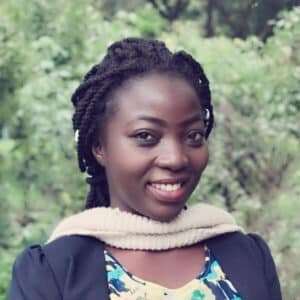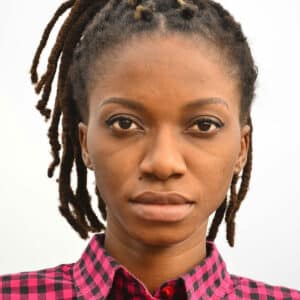Christ Mukenge: What were your first professional experiences as a cartoonist at the local and international level?
Santa Kakese: At the very beginning of my career, in 2012, I made a comic book to raise awareness of “hare’s beak,” called “OPERATION SMILE”, with the Gertler Family Foundation. I have also participated in several collectives: at the international level: with the African Comics Bible project in Kenya in 2018, and with the publishing house PJA and Comix35. At the local level I took part in an exhibition, sale and dedication at “SABDAM” (Salon Africain de la Bande Dessinée et de l’Autre Musique) in 2019.
Judith Kaluaji: I had two publications in the collective fanzine “Amazone 1 and 2”, published by Kin Label in 2011 and 2013. Apart from that, I did an exhibition on comics at the French Institute in 2018 with the collective “Bulle Africaine”. I also took part in the first Zando comic at the Academy of Fine Arts in Kinshasa in 2019 and in the African Comics Exhibition SABDAM at the national museum in 2019. And a workshop on comics with PJA and Comix35 in Kinshasa in 2016. At the international level, I participated in the Algiers International Comics Festival in 2011 as well as an exhibition in France on Kinshasa urbain (MiAM), in 2017.
Christ Mukenge: How do you build your work?
Santa Kakese: I am mainly inspired by my environment, my community and my society. I write and draw stories that are lived and told, but I also draw stories written by other screenwriters. I self-publish my works, and I also participate in collective editions.
Judith Kaluaji: I start by conceiving the general idea of the subject to be treated, then I create characters and identify situations. Then I draw plates that I scan for colouring on photoshop, and finally I add my dialogues.
Christ Mukenge: Who inspires you in your work and what are your influences?
Santa Kakese: My coach Mola Boyika for the exaggeration of forms, expression and movement of the characters. Our great Barly Baruti for his realistic style, the details of the characters and landscapes. The cartoonist Jérémie Nsingi for the beautiful representation of his female characters.
Judith Kaluaji: My source of inspiration is nature and our everyday life. Life in Kinshasa inspires me enormously. Sometimes I’m directly or indirectly inspired by my own lived experiences. For example, a subject that I have dealt with in the past, “Matanga,” the number of pages were insufficient to deal with the matter, because there is (too) much to be said about mourning in Kinshasa.
Christ Mukenge: In your opinion, what is the place of the woman artist in society?
Santa Kakese: The woman artist has a remarkable place in society. Being a woman is an asset when it comes to being an artist. The woman has the facility to feel the realities of the environment because of her psychological assets. She is the appropriate voice for the needs and expectations of society.
Judith Kaluaji: In my opinion, women occupy a second place compared to men in our society. There are differences in cachet in some cases, there are also some people who doubt women’s artistic abilities. Women have the same abilities and faculties as men, so they deserve the same treatment as men. I am sure this will change very soon.
Christ Mukenge: Does gender play a role in your artistic productions?
Santa Kakese: Yes, my gender plays a big role in my artistic production, because I have had some privileges in this field because of my talent, but also because I am a woman. And the fact that women cartoonists and comic artists are rare in my country makes us special.
Judith Kaluaji: Yes, my gender plays a role in my productions in that I am in the best position to deal with subjects that affect us directly, for example I speak better about menstruation than men. And above all, I give leading roles to my female characters.
Christ Mukenge: What are the approaches dealt with in your comics?
Santa Kakese: I tell our lives, our realities of life in the DRCongo, in Kinshasa. I don’t only deal with subjects concerning women. The proof of this is my comic book “M’Fumu-Buku,” about a brilliant student, unlike a current comic book project renamed “207,” which is about a driver and a ticket inspector.
Judith Kaluaji: I deal with themes that encourage women to accept themselves, especially their contribution to the development of our society. For me, women have a lot of potential to bring to the fore. In my next comic book projects, I will encourage more young people to become entrepreneurs, because it is one of the solutions to creating more jobs in a society where the unemployment rate is very high.







